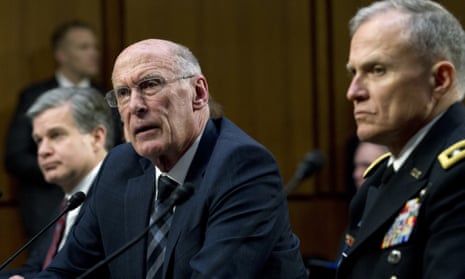The head of US intelligence has said that North Korea is “unlikely to give up” its nuclear weapons because its leadership sees them as “critical to regime survival” – in comments which contrasted sharply with Donald Trump’s own assessment.
Daniel Coats, the director of national intelligence, made his assessment in a written statement on “worldwide threats” to the Senate on Tuesday, which was noteworthy for the many ways it differed from the rhetoric favoured by the president and his top aides.
The gaps were not only evident on North Korea, but also on Iran’s nuclear programme, the continuing threat of the Islamic State in Syria and on the importance of climate change. The distance between the White House and its intelligence agencies was highlighted further in verbal testimony to the Senate intelligence committee by Coats, alongside the heads of the CIA, DIA and NSA who also testified.
Coats’s assessment on North Korean intentions had particular impact as it comes in the run-up to a planned second summit at the end of February between Trump and Kim Jong-un.
Trump has rejected repeated reports that – while the Pyongyang regime has halted nuclear and missile tests since the first summit in Singapore last June – it has not paused its production of nuclear weapons and may have stepped it up.
“The media is not giving us credit for the tremendous progress we have made with North Korea,” Trump complained in a tweet last week. The secretary of state, Mike Pompeo, has insisted that the diplomatic effort was aimed at complete North Korean disarmament.
In his written testimony, however, Coats said: “We continue to assess that North Korea is unlikely to give up all of its nuclear weapons and production capabilities, even as it seeks to negotiate partial denuclearization steps to obtain key US and international concessions.”
“North Korean leaders view nuclear arms as critical to regime survival,” Coats argued.
He went on to point out that Kim Jong-un’s pledge in Singapore to pursue the “complete denuclearization of the Korean peninsula” – which Trump and Pompeo portrayed as a historic breakthrough – was no more than “a formulation linked to past demands that include an end to US military deployments and exercises involving advanced US capabilities”.
That assessment of North Korea was echoed by the head of the Defence Intelligence Agency, Lt Gen Robert Ashley. He told the Senate committee: “The capability and threat that existed a year ago are still there.”
In contrast, Coats said that US intelligence “continue to assess that Iran is not currently undertaking the key nuclear weapons-development activities we judge necessary to produce a nuclear device”.
He noted that Iran’s activities are limited by the 2015 multilateral nuclear deal, the Joint Comprehensive Plan of Action (JCPOA), but as Iran derives ever fewer benefits from the deal, hardliners are pressing for the state to break free of those constraints.
Trump abrogated the JCPOA in May last year and his administration has threatened sanctions against anyone doing business with Iran.
Pompeo and the national security adviser, John Bolton, have described Iran as the biggest terrorist threat in the world, but the intelligence community’s worldwide threats assessment does not echo that view. It lists Iran below Isis and al-Qaida and homegrown extremists.
The intelligence report also represented a rejoinder to Trump’s claims of victory over Isis in Syria.
Coats’s written testimony said: “Isis still commands thousands of fighters in Iraq and Syria, and it maintains eight branches, more than a dozen networks, and thousands of dispersed supporters around the world, despite significant leadership and territorial losses.”
On a day that Trump ridiculed concern about climate change because of the current blast of arctic weather in the midwest, the intelligence report also includes sombre predictions of the repercussions of global warming.
Trump has dismissed climate change as a hoax, and on Tuesday tweeted: “What the hell is going on with Global Waming? Please come back fast, we need you!”
The administration has scrubbed references to climate science from government websites, but Coats’s report presented it as a major threat.
“Climate hazards such as extreme weather, higher temperatures, droughts, floods, wildfires, storms, sea level rise, soil degradation, and acidifying oceans are intensifying, threatening infrastructure, health, and water and food security,” Coats warned.
